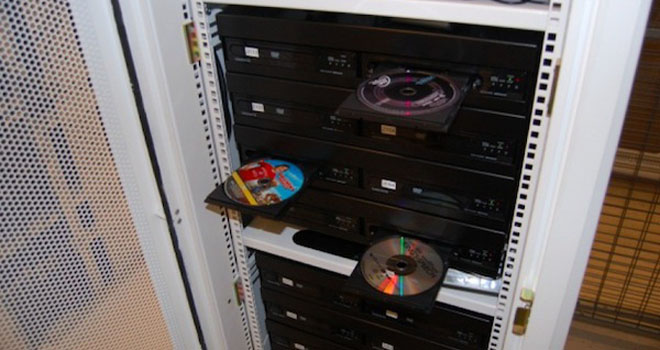Cheesed-off Netflix subscribers who are looking for online streaming alternatives might want to check out Zediva, a startup that rents out the top 100 popular movies of the past year online.
The Sunnyvale startup gets access to the latest DVDs the day they come onto the market and allows remote viewers to watch movies streamed from DVD players located at Zediva’s facilities.
The service is a little buggy, but it is convenient. Unlike Netflix, no browser plug-ins are required. In addition, because viewers are literally watching a DVD, features such as closed-captioning and different language selections are available.
The service only allows one device to access a movie at a time. That means that if you’re trying to watch an extremely popular new movie on DVD, you might be out of luck until you receive an e-mail or a text message telling you that the movie is available.
The fact that Zediva enables online streams to movies the day they are released to the public as DVDs is one of the primary factors that distinguishes the service from Netflix and iTunes. Its prices are another factor. The service charges $1.99 for one rental, or $10 for a rental package of 10. Each rental gives you a four-hour window in which to watch the movie.
As of now, the service is invitation only, but a spokesman for the firm says that invites are sent out shortly after users sign up for the service. Zediva claims it has thousands of users.
These factors — the streaming, the movies’ availability online the same day as the DVDs’ release — have Hollywood studios up in arms.
The Motion Picture Association of America has filed lawsuits against both the company and its founder Venky Srinivasan to stop the service. The Hollywood studios claim the company is violating copyright law, and, by streaming the content online, conducting unauthorized public performances — kind of like running an online movie theater without obtaining authorization from the copyright holders.
But Zediva has countersued, asking a judge to declare the service legal. Its lawyers argue that the service is more like a traditional DVD rental store, or like the Sling Media service because only one household can access a physical disc at a time.
Some lawyers are pessimistic about the chances of Zediva’s survival. Others point to a 2007 Second Circuit Court decision about remote DVRs as a reason for optimism.
What is clear is that the legal community is watching this Zediva case for further guidance on the legality of such services.









